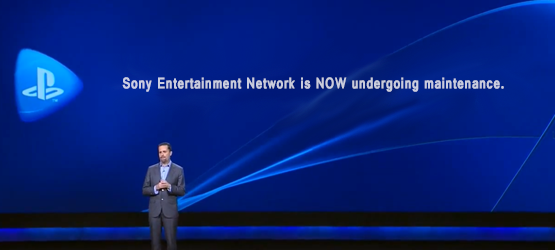Today at CES, Sony finally announced why they spent $380 million on Gaikai. Called ‘PlayStation Now’, it’s an ambitious plan to bring PS3 games to PS3s, PS4s, PS Vitas and even TVs by cloud streaming them. What will this mean for the future of PlayStation? Daily Reaction’s Sebastian Moss and Dan Oravasaari discuss.
Seb: It’s interesting – because we all knew this was coming, and have been expecting a similar announcement for a while, the news almost seems mildly anticlimactic. But it’s essentially the birth of a whole new console.
At first this is just a brilliant way for PlayStation faithfuls to play PS3 games they don’t have on their PS3, bring backwards compatibility of a sort to PS4 and make the PS Vita the most powerful device of its size. However, the implications are so much bigger. Add in TVs, and soon after tablets, phones and possibly even computers… that’s a lot of people who wouldn’t have normally been willing to plop down $399 + games to play a few titles they were mildly interested in, now able to play them after clicking a few buttons (hopefully). A. lot. of. people.
The impact of ‘immediate PlayStation games’ coming to PlayStation platforms and “numerous other Internet-connected devices” is potentially huge. Excitingly, Sony has already announced that they’ll offer the option to either rent a single title or pay a subscription to play that will “enable you to explore a range of titles” (note: they didn’t say “all”). That’ll allow a lot of people to dip their toe in and play a few games before they get hooked on PlayStation gaming and trophy collecting. If they’re smart, they’ll also have a demo for those with borderline internet connections.
What this comes down to at first is two factors – internet speeds and price. For internet, Sony’s audience will initially be obviously limited, but if Netflix and its early naysayers have taught us anything, that can radically change in just a matter of years. And, with Google Fiber and all sorts of exciting internet developments, many believe that the majority of the US and Western Europe will be boasting 100mbps plus in a few years. While cloud gaming is impossible for a lot of us, it won’t remain that way forever.
As for price, I doubt it will be cheap, this is early times for the service and the idea of cloud gaming, so we’ll be paying for the hundreds of thousands of servers of sufficient power to play console quality games, including PS4 ones eventually. But Sony has shown increasingly forward thinking pricing when it comes to PSN, and with PS4 users already expected to pay for PlayStation Plus, so we can only hope it won’t be too crazy (as well as discounted for PS Plussers).
If the price isn’t too high, there’s a good chance this could become a big hit in the future. But this is certainly a product of the future: Most of us won’t be ready for it yet, and I doubt Sony will too.
Over the course of this holiday season, we saw just how badly Sony is prepared for things like high PS4 sales or Christmas gaming. It went down constantly, with customers treated to poor communication, and it even suffered from a DDoS attack. PlayStation Now is significantly more complex and infrastructure intensive, so it’s undoubtable that PSNow will crash a lot in its early stage – it just can’t crash too much to destroy faith in the platform.
Dan: What we are seeing now is, exactly as Sebastian has just said, the future. What we are seeing now is the foundations of how the PlayStation brand will more than likely be succeeded in the next generation, or the one after that. Sony did not purchase Gaikai for almost $400 million for a simple experiment, this is an ecosystem builder that not only joins their major investment into gaming software, but also that of many of their electronic devices.
This, of course, leaves many questions left to be answered. As Seb also brought up, the price is going to be a driving factor for Sony to make this into something ‘Now’ and not ‘maybe later.’ As with the launch of many new devices or services, you only really get one chance to prove to people that it could be something, and if you fail, it is a long and expensive road to regain the interest of the consumer market. As Sony is going to be the first of the major console manufacturer to push this type of service, which we all knew was coming, they have no guide for a successful business model and that means the consumer market won’t know what to expect either.
Sony did state that they will also be using PlayStation Now as a subscription service, but also a rental one, which I do believe will be the more successful of the two options, at least for a while. A subscription model that allows subscribers to have unlimited access to all of Sony’s library is not a realistic concept, at least not one that has a reasonable pricing model. This is why Sony will probably not be pushing every title through their service, not to mention keeping any titles that could have latency issues that would make the game unusable with our current infrastructure off as well.
So, this is why I think a rental option will be the most popular root for gamers, but how much is going to be enough to offset the loss of people who will just be renting instead of buying? Older titles on the PS3 can still run between $30 and $60, and renting it out for something like $5 can still become a loss of potential revenue if the pool of people isn’t seeing an exponential growth. This also becomes the question of duration, as $5 a day could work to let people try out a game before buying it or it could simply have people only spending a fraction of the cost to play through shorter titles. This is something that could eventually have a drastic effect on the production of shorter games industry wide, for better or worseWhat about the much debated subscription model? Again, this is a balance between product availability and price. If the service has too many major releases and uses a subscription of $100 a year, people would be basically be getting the same experience for a fraction of the normal cost, but also cutting the bottom line for those developers. Then again, if the PlayStation Now line up doesn’t have enough titles to warrant people investing upfront, no one will use the service, and it will fail. The real issue is that consumers and gamers, even more so, have become almost a bit too entitled and will complain about the price no matter what the offering.
So, as Sony kicks off their new streaming service, there seems to be more questions than answers and I honestly believe that even they don’t know what will happen. But, I do know that what we are seeing now is potentially the beginning of something huge for the industry, and as excited as I am to see it happening before my eyes, I am also curious to see how this balances out with the ever growing cost of development.
What do you think of PlayStation Now, now? Share your thoughts in the comments below, rent some love at [email protected], and subscribe on Twitter at Seb and Dan.








